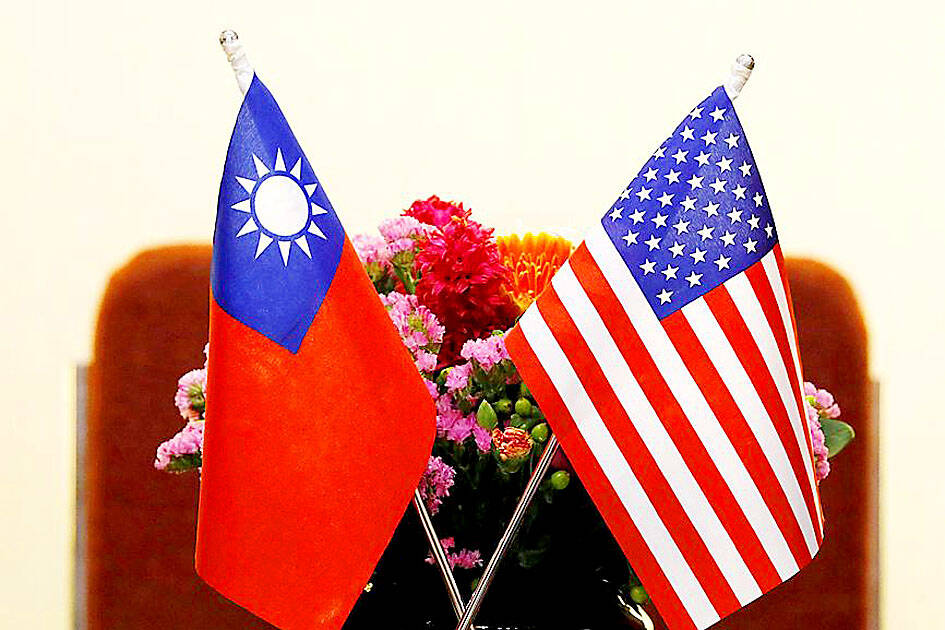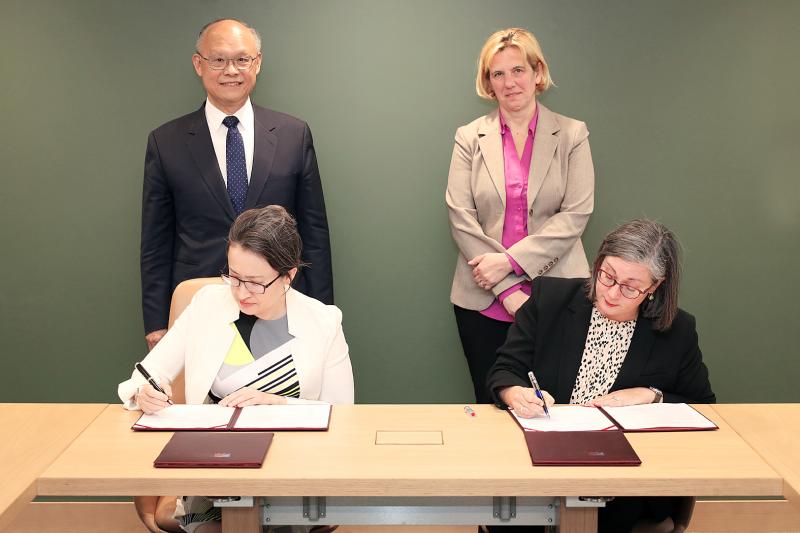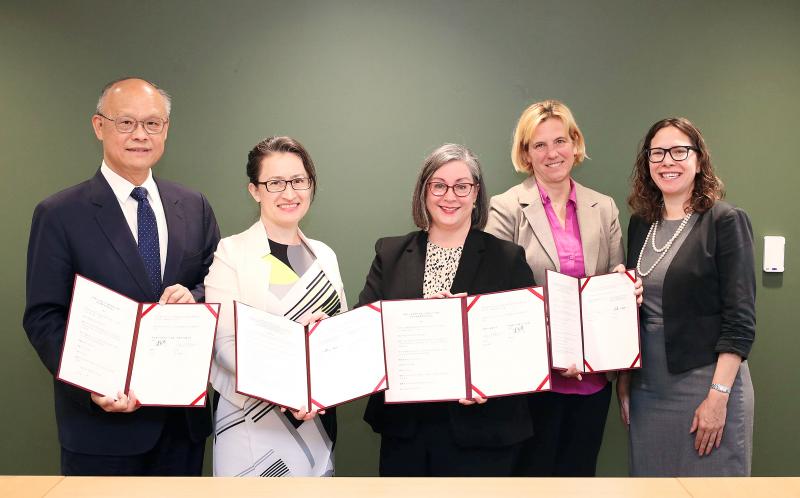Taiwan and the US yesterday signed an initial agreement under the US-Taiwan Initiative on 21st-Century Trade.
The agreement was signed yesterday morning by Representative to the US Hsiao Bi-khim (蕭美琴) and American Institute in Taiwan (AIT) Managing Director Ingrid Larson in Washington, the Office of Trade Negotiations in Taipei said.
The ceremony was witnessed by Minister Without Portfolio John Deng (鄧振中) and Deputy US Trade Representative Sarah Bianchi.

File Photo: REUTERS
Taiwan and the US started talks under the initiative in August last year, after Taipei was left out of the Washington-led Indo-Pacific Economic Framework.
“The deal that will be signed tonight is not only very historic, but also signals a new beginning,” Cabinet spokesman Alan Lin (林子倫) told reporters in Taipei yesterday.
“Relevant tasks are yet to be completed... Taiwan will continue to move toward a comprehensive FTA [free-trade agreement] with the United States to ensure Taiwan’s economic security,” Lin said.

Photo courtesy of the Office of Trade Negotiations
Officials from both sides have conducted two rounds of negotiations to finalize the initial agreement, which covers customs and trade facilitation, regulatory practices, domestic regulation of services, anti-corruption practices, and small and medium-sized enterprises.
The two sides are committed to working to facilitate bilateral trade and investment flows, improve regulatory practices, promote anti-corruption measures, and minimize unnecessary border formalities, the office said.
It does not cover tariff reductions or exemptions, but instead outlines practices and procedures aimed at streamlining and strengthening trade relations.

Photo courtesy of the Office of Trade Negotiations
The hope is that the initial agreement would be expanded to include other topics mandated in the initiative, such as agriculture, standards, digital trade, labor, environment, state-owned enterprises, and non-market policies and practices, the office said.
Business groups in Taiwan welcomed the deal, but urged both sides to resolve the issue of double taxation to reduce business costs.
On Thursday last week, US representatives Adrian Smith, Suzan DelBene, Nicole Malliotakis and Judy Chu (趙美心) introduced a bipartisan resolution calling for legislation to avoid double taxation between the US and Taiwan, one of the latest efforts by US lawmakers to ensure double taxation does not stand in the way of mutual investment.
Additional reporting by AFP

A magnitude 7.0 earthquake struck off Yilan at 11:05pm yesterday, the Central Weather Administration (CWA) said. The epicenter was located at sea, about 32.3km east of Yilan County Hall, at a depth of 72.8km, CWA data showed There were no immediate reports of damage. The intensity of the quake, which gauges the actual effect of a seismic event, measured 4 in Yilan County area on Taiwan’s seven-tier intensity scale, the data showed. It measured 4 in other parts of eastern, northern and central Taiwan as well as Tainan, and 3 in Kaohsiung and Pingtung County, and 2 in Lienchiang and Penghu counties and 1

FOREIGN INTERFERENCE: Beijing would likely intensify public opinion warfare in next year’s local elections to prevent Lai from getting re-elected, the ‘Yomiuri Shimbun’ said Internal documents from a Chinese artificial intelligence (AI) company indicated that China has been using the technology to intervene in foreign elections, including propaganda targeting Taiwan’s local elections next year and presidential elections in 2028, a Japanese newspaper reported yesterday. The Institute of National Security of Vanderbilt University obtained nearly 400 pages of documents from GoLaxy, a company with ties to the Chinese government, and found evidence that it had apparently deployed sophisticated, AI-driven propaganda campaigns in Hong Kong and Taiwan to shape public opinion, the Yomiuri Shimbun reported. GoLaxy provides insights, situation analysis and public opinion-shaping technology by conducting network surveillance

‘POLITICAL GAME’: DPP lawmakers said the motion would not meet the legislative threshold needed, and accused the KMT and the TPP of trivializing the Constitution The Legislative Yuan yesterday approved a motion to initiate impeachment proceedings against President William Lai (賴清德), saying he had undermined Taiwan’s constitutional order and democracy. The motion was approved 61-50 by lawmakers from the main opposition Chinese Nationalist Party (KMT) and the smaller Taiwan People’s Party (TPP), who together hold a legislative majority. Under the motion, a roll call vote for impeachment would be held on May 19 next year, after various hearings are held and Lai is given the chance to defend himself. The move came after Lai on Monday last week did not promulgate an amendment passed by the legislature that

AFTERMATH: The Taipei City Government said it received 39 minor incident reports including gas leaks, water leaks and outages, and a damaged traffic signal A magnitude 7.0 earthquake struck off Taiwan’s northeastern coast late on Saturday, producing only two major aftershocks as of yesterday noon, the Central Weather Administration (CWA) said. The limited aftershocks contrast with last year’s major earthquake in Hualien County, as Saturday’s earthquake occurred at a greater depth in a subduction zone. Saturday’s earthquake struck at 11:05pm, with its hypocenter about 32.3km east of Yilan County Hall, at a depth of 72.8km. Shaking was felt in 17 administrative regions north of Tainan and in eastern Taiwan, reaching intensity level 4 on Taiwan’s seven-tier seismic scale, the CWA said. In Hualien, the